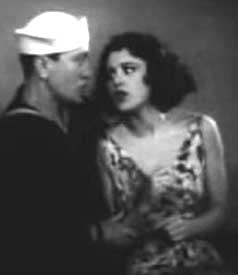 As the musical short Naughty-Cal (1930) begins, a rather unlikely dance ball is being held on board a navy ship with lots of gals on board dancing along the decks with the sailors.
As the musical short Naughty-Cal (1930) begins, a rather unlikely dance ball is being held on board a navy ship with lots of gals on board dancing along the decks with the sailors.
Billy (Bobby Watson) didn't have a dress uniform & borrowed one from a shipmate, & the guy who loaned them wants his uniform back.
Billy & his girlfriend Lillian (Lillian Roth) are shmoozing apart from the ball. The film's star Lillian Roth was a great singer of the '20s & '30s who was still around for a long time after, but pretty much sabotaged her career through alcoholism, or she'd be a household name still, as she was pretty darned good.
She sings "True to the Navy" to her boyfriend, a hit song for her at the time. It's kind of an old-fashioned tune but with witty lyrics in praise of a navy lover. She & Billy begin dancing until she gets annoyed with his gum-chewing & abandons him to dance alone with his eyes closed & gums flapping, until he trips & falls.
He sits beside her trying to placate her bad mood, until she bursts into a smile to sing the uptempo jazz number "You Can't Get Along without Love," with the vocal power of a young Ethel Merman, a much more thrilling tune than the first, & a song that deserves to be better known.
Soon a mess-load of sailors are trying to get Lillian to dance with them, & Billy gets annoyed. He finds a bugel & blows a call for a motor launch so all the sailors run off. When Billy sits down beside her now that she's alone, we hear his ill-fitting trousers rip up the behind.
He says, "You accuse me of having a girl in every port. I turn my back & you've got a dozen guys hanging around." This induces her to sing a song about being boyfriend & girlfriend since they were kids. It turns into a romantic duet called "Says Who?"
It ends with the supposed joke of Billy's torn pants falling down. As comedy skit this pretty much fails but the music is pleasing enough & Lillian Roth certainy worthy of acquaintance.
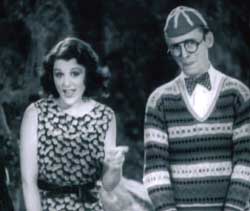 A chorus of college boys at a park sing a cute diddy "We Got 'It' but 'It' Don't Do Us No Good," setting a jaunty comic mood in the one-reel musical short Meet the Boyfriend (1930) starring Lillian Roth.
A chorus of college boys at a park sing a cute diddy "We Got 'It' but 'It' Don't Do Us No Good," setting a jaunty comic mood in the one-reel musical short Meet the Boyfriend (1930) starring Lillian Roth.
Lillian, who is damnably appealing in this film, seems bored, but really she's just disappointed because Jimmy hasn't shown up at the picnic.
She sings the longing ballad "So Alonesome," an ordinary pop tune of the era that was never quite in line to become a standard.
At the climax Jimmy shows up & he's a super geek in a beany. But love is blind & Lillian sings "Me & My Boyfriend Jimmy" while menacing poor frightened frightened Jimmy with her lustiness.
Meet the Boyfriend is charming wee film, even if the slightest of Lillian Roth's few film appearances.
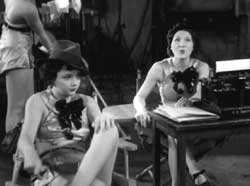 A musical short subject packed with songs written by Cliff Hess, Story Conference (1934) opens on a comedic version of a Victorian melodrama & a large cluster of chorus girls bursting into a fun number "Working in the Movies."
A musical short subject packed with songs written by Cliff Hess, Story Conference (1934) opens on a comedic version of a Victorian melodrama & a large cluster of chorus girls bursting into a fun number "Working in the Movies."
The choreography takes advantage of every corner of a movie set. The song's lyrics specifically praise of Vitaphone musical shorts:
"Early in the morning we are shot/ Our director says we show promise/ Anyone can tell, I'm another Joan Blondell/ What a happy family, just like home/ Working in the movies for the Vitaphone."
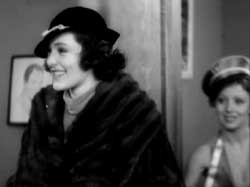 Then writers get together for a story conference, to trump up a script with songs for a film that will star Lillian Roth. Then writers get together for a story conference, to trump up a script with songs for a film that will star Lillian Roth.
Lillian shows up for the conference, & as story ideas are tossed out, we jump-cut to the sundry premises suggested.
On the courthouse steps, surrounded by dancing girls, Lillian sings superbly about having had five marriages & five divorces in "Little Alimony Sal" which runs in part:
"Five times now my wedding bells have rung out/ Five times now that mean old judge has sung out/ You're free, you're free, as a bird on high/ I'm free, poor me, & now that's why --- they call me Alimony Sal/ I'm just a matrimony gal..."
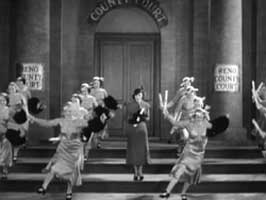 This number blends smoothly into a chorus line number "Alimony Hotel," with a scaled-down version of the big 42nd Street dance sequence culminating in a cut-away of the hotel showing dancing divorcees in every room. This number blends smoothly into a chorus line number "Alimony Hotel," with a scaled-down version of the big 42nd Street dance sequence culminating in a cut-away of the hotel showing dancing divorcees in every room.
The next story conference idea puts Lillian in a laundry with lots of washermaids to sing "My Man Blues" alongside her:
"I've got the blues, but what's the use/ My man has gone & left me/ And that's why I've got the blues..."
The third story idea is a fantasy of a trio of singing scarecrows. In the cornfield the scarcrows spring to life to sing "Down the Old Back Road" to a hobo:
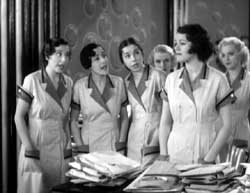 "Down the old back road, the family stew is stewin'/ There's a brand new batch of home brew brewin'/ Down the old back road..." "Down the old back road, the family stew is stewin'/ There's a brand new batch of home brew brewin'/ Down the old back road..."
These three guys called themselves The Sizzlers. They also appear in the Lita Grey Vitaphone short Seasoned Greetings (1933) & the Jeanne Aubert Vitaphone The Mysterious Kiss (1934).
They were among the "almost" singing stars of the era, but were never interesting enough to catch fire.
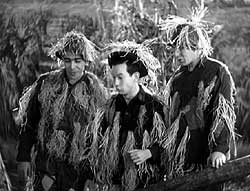 Roth wasn't in that sequence, which so annoyed director that he gave up on the conference of writers & came up with a way of working these dumb ideas into a whole. Roth wasn't in that sequence, which so annoyed director that he gave up on the conference of writers & came up with a way of working these dumb ideas into a whole.
The director imaginines a big climactic song that has a tenor singing "If I Were a Millionaire" to Lillian.
This is followed by a splendid dance with Follies girls on a surrealistic set of giant jewelry, & general Ziegfield effect.
The courthouse steps & Alimony Hotel segment had been a big number, but this Follies conclusion is even bigger.
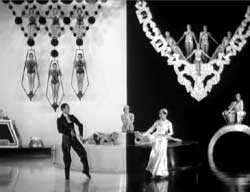 We get overhead shots of dancers forming kalaidoscope movements, & a whole set divided in half -- one side black, the other side white -- for the many girls plus the adagio dance couple. We get overhead shots of dancers forming kalaidoscope movements, & a whole set divided in half -- one side black, the other side white -- for the many girls plus the adagio dance couple.
This couple is Eugene Von Grona & his wife Leni Bouvier. They had started out as ragtime dancers in Germany.
They came to America because it was the birthplace of their favorite music, & Harlem was their Mecca.
They put together an African American dance troupe that should've been more famous, but for the tone of the times, which was more than a little wonky about the acceptibility of mixed race dance troupes.
Their performance in Story Conference is comparatively conserviative, romantic in the manner of Rogers & Astair, but a nice opportunity to see a couple significant in the history of modern dance.
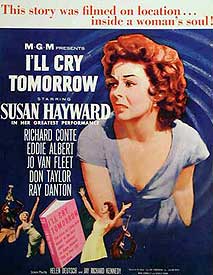 Naughty-Cal together with Story Conference truly captures the beauty & extraordinary talent of Lillian Roth in her prime. And anyone who has seen the actual impact she was capable of making on the screen will be less impressed by Susan Hayward's tasteless impersonation of Roth in I'll Cry Tomorrow (1955), though whoever never saw the actual Roth might find the melodramatic biopic impressive.
Naughty-Cal together with Story Conference truly captures the beauty & extraordinary talent of Lillian Roth in her prime. And anyone who has seen the actual impact she was capable of making on the screen will be less impressed by Susan Hayward's tasteless impersonation of Roth in I'll Cry Tomorrow (1955), though whoever never saw the actual Roth might find the melodramatic biopic impressive.
Starting at age eight with a horrid pushy stage-mother (Jo Van Fleet), I'll Cry Tomorrow is based on the autobiography of Lilian Roth. Carole Ann Campbell plays Lillian as a child, whose mother makes entering the entertainment industry pure nightmare. And in her whole career, no matter the success, in her heart, it just never got better.
Or so goes the legend after Lillian's book & especially this film reformed her life into a tidy package that left her for the rest of her life a symbol of alcoholism in Hollywood, & Roth would thereafter impersonate Susan Hayward impersonating Lillian Roth in order to live out her last hurrah.
Hayward plays Lillian from teen years to maturity. As a young, vital, exciting, on-the-rise Lillian Roth the casting is moronic. Pushing forty, there's just no way Hayward captures anything resembling youth, let alone the charismatic woman Roth was in her teens & twenties.
And if already Lillian as portrayed here seems to be the same age as her mother, it's because Hayward & Van Fleet were indeed about the same age.
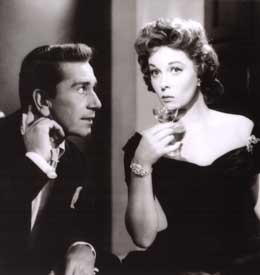 Eventually Hayward will seem like better casting but not until it's time to portray Roth as a worn-out, prematurely aged, pathetic drunkard. Until the character is suitably deteriorated, it's like watching grandma cast as Shirley Temple. Eventually Hayward will seem like better casting but not until it's time to portray Roth as a worn-out, prematurely aged, pathetic drunkard. Until the character is suitably deteriorated, it's like watching grandma cast as Shirley Temple.
At least the first third, perhaps half of the film is ridiculous, not only because Hayward is vastly too old for the role, but also because she can't sing. The film studio had the strange audacity to release the songs with considerable publicity insisting Hayward was a great singer, but she was at best barely adequate, & if Lillian Roth's talent as a singer is the measure, then Hayward was wholly inadequate.
We first see Lillian Roth in young adulthood in a sexy sensual jazz scene singing "Sing You Sinners." As a rule it's just awful when some actor plays a singer who has to be dubbed by someone with a completely different voice than the actor. But even worse is some actor who can't sing singing anyway. The young Roth was a fine singer with an amazing charisma, and middleaged Susan Hayward is a terrible singer with no charisma.
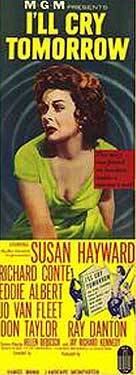 David (Ray Danton) had been her friend in childhood. He still loves her, & she him, but horrible Mom doesn't want to lose control of her daughter. Lillian would nevertheless gladly give up her career in favor of love & a homelife, but David turns out to be terminally ill. David (Ray Danton) had been her friend in childhood. He still loves her, & she him, but horrible Mom doesn't want to lose control of her daughter. Lillian would nevertheless gladly give up her career in favor of love & a homelife, but David turns out to be terminally ill.
As he's dying in the hospital, she's busy entertaining, singing "Red Red Robin." Hayward sings it as well as the average stripper of the day might've done, but she's supposed to be one of the best vocalists of the era.
The awful melodrama continues as Lillian strives to carry on without David, but sinks into depression & bitterness. As an emotional basketcase, it doesn't take much to push her over the edge into alcoholism, & according to this version of how she began her decline, a private nurse hooked her on booze.
Because Hayward seemed so dissolute from the start, there's no real transition from the freshness of a tremendously talented young woman to a deteriorating drunk. If you've seen Roth's few film appearances when she was on the rise, you know that this hag with a boozy voice is not who she was. But slowly, as the story becomes darker & darker, the boozy-voiced hag becomes good casting.
She meets a soldier, Wallie (Don Taylor), goes on a bender with whim, blacks out, & wakes up married to a man she can only stomach when drunk. He eventually sobers up long enough to divorce her.
Her next relationship is with Tony (Richard Conte), a scheming, slightly mad, very charming, ultimately sadistic s.o.b. He's the first interesting character in this damned film, but when we see him beat the living daylights out of a drunk man, it's obvious Lillian should not be getting involved with this guy.
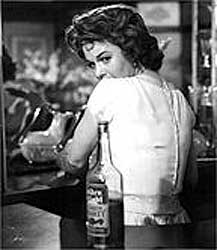 Up to now it's been totally puzzling why this film got an Oscar nomination for Best Actress. It's been badly written, badly sung, miscast, & kind of laughable. But when we're no longer being asked to accept middleaged Hayward as a kid with a golden voice, she's perfect as the ruined drunk. Up to now it's been totally puzzling why this film got an Oscar nomination for Best Actress. It's been badly written, badly sung, miscast, & kind of laughable. But when we're no longer being asked to accept middleaged Hayward as a kid with a golden voice, she's perfect as the ruined drunk.
Alas she still can't sing worth a damn, so when she's on stage singing "Happiness is a Thing Called Joe" drunk out of her mind, it begins to be credible that her singing is so bad. The strange thing, though, is Hayward sings it slightly better than when she's supposed to be sober.
Tony turns out to be a horrid vengeful appalling man upon who she becomes dependent, as he becomes increasingly violent in his abuses. Escaping from him turns dangerous, & this is the most shocking & effective part of the largely ineffectual film.
The depth & severity of her alcoholism is shocking to see portrayed so brutally on screen, & suddenly it's clear how it got its Oscar nomination, though also clear why it didn't win since scenery-chewing & screaming & throwing oneself about like a spastic rabbit is not really great acting.
The second half of the film heaps horror upon degradation. Her career over, living with her aging stage-mother, flying into drunken rages avenging herself upon her mother for all the real & imagined hurts of a lifetime. For this patch of the story, the film pulls no punches & both Hayward & Van Fleet are delivering the kind of terrifying performances B horror fans take for granted.
Unfortunately, there are so many scenes of self-degradation that it does eventually seem a bit burlesque. And then it peters out as a story. On the verge of suicide, Lillian does a sudden about-face, & the film becomes a maximumly sappy paeon to Alcoholics Anonymous. Lillian develops a friendship with the sainted Burt (Eddie ALbert), & begins to salvage her life in three easy lessons. It ends as an educational advertisement for A.A. performed by the numbers.
copyright © by Paghat the Ratgirl
|
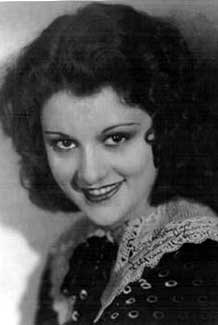



 Then writers get together for a story conference, to trump up a script with songs for a film that will star Lillian Roth.
Then writers get together for a story conference, to trump up a script with songs for a film that will star Lillian Roth. This number blends smoothly into a chorus line number "Alimony Hotel," with a scaled-down version of the big 42nd Street dance sequence culminating in a cut-away of the hotel showing dancing divorcees in every room.
This number blends smoothly into a chorus line number "Alimony Hotel," with a scaled-down version of the big 42nd Street dance sequence culminating in a cut-away of the hotel showing dancing divorcees in every room. "Down the old back road, the family stew is stewin'/ There's a brand new batch of home brew brewin'/ Down the old back road..."
"Down the old back road, the family stew is stewin'/ There's a brand new batch of home brew brewin'/ Down the old back road..." Roth wasn't in that sequence, which so annoyed director that he gave up on the conference of writers & came up with a way of working these dumb ideas into a whole.
Roth wasn't in that sequence, which so annoyed director that he gave up on the conference of writers & came up with a way of working these dumb ideas into a whole. We get overhead shots of dancers forming kalaidoscope movements, & a whole set divided in half -- one side black, the other side white -- for the many girls plus the adagio dance couple.
We get overhead shots of dancers forming kalaidoscope movements, & a whole set divided in half -- one side black, the other side white -- for the many girls plus the adagio dance couple.
 Eventually Hayward will seem like better casting but not until it's time to portray Roth as a worn-out, prematurely aged, pathetic drunkard. Until the character is suitably deteriorated, it's like watching grandma cast as Shirley Temple.
Eventually Hayward will seem like better casting but not until it's time to portray Roth as a worn-out, prematurely aged, pathetic drunkard. Until the character is suitably deteriorated, it's like watching grandma cast as Shirley Temple. David (Ray Danton) had been her friend in childhood. He still loves her, & she him, but horrible Mom doesn't want to lose control of her daughter. Lillian would nevertheless gladly give up her career in favor of love & a homelife, but David turns out to be terminally ill.
David (Ray Danton) had been her friend in childhood. He still loves her, & she him, but horrible Mom doesn't want to lose control of her daughter. Lillian would nevertheless gladly give up her career in favor of love & a homelife, but David turns out to be terminally ill. Up to now it's been totally puzzling why this film got an Oscar nomination for Best Actress. It's been badly written, badly sung, miscast, & kind of laughable. But when we're no longer being asked to accept middleaged Hayward as a kid with a golden voice, she's perfect as the ruined drunk.
Up to now it's been totally puzzling why this film got an Oscar nomination for Best Actress. It's been badly written, badly sung, miscast, & kind of laughable. But when we're no longer being asked to accept middleaged Hayward as a kid with a golden voice, she's perfect as the ruined drunk.